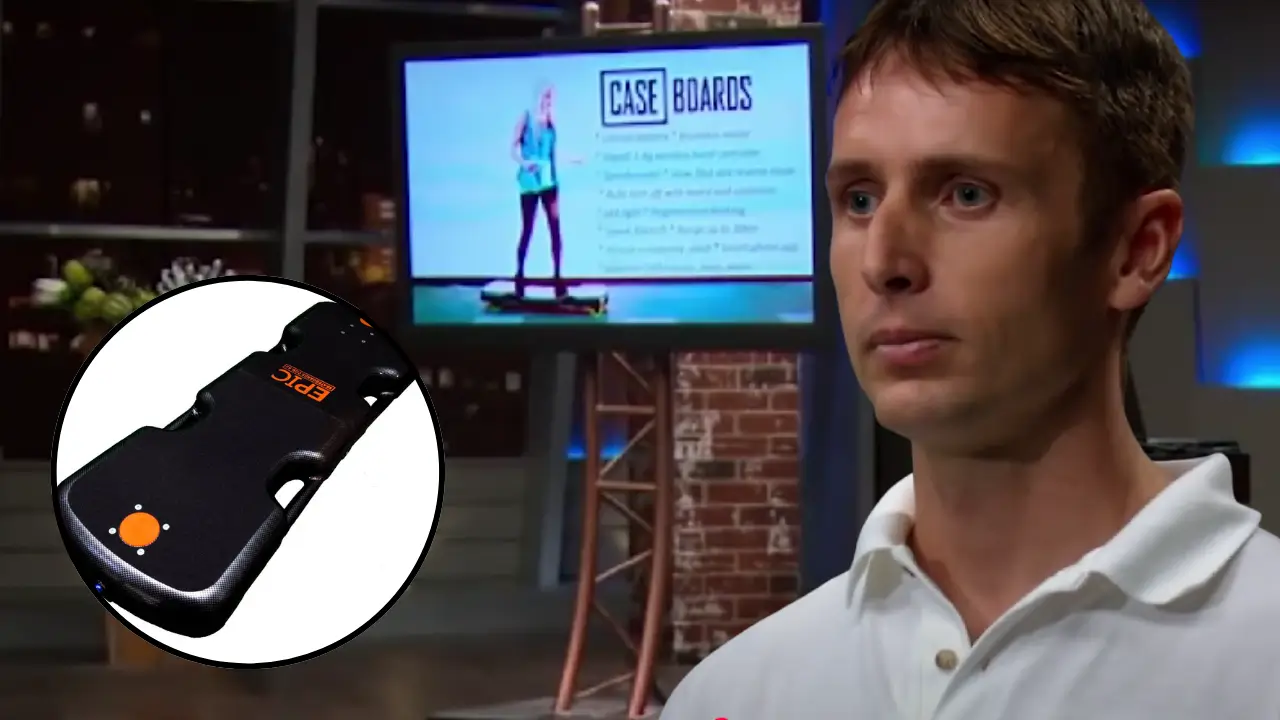CaseBoards Net Worth 2025: From Shark Tank Hype to Business Uncertainty
Case Boards Net Worth is estimated at $100K–$150K AUD in 2025, but regulatory issues and product discontinuation cloud its future.
When a skateboard folds into a briefcase and hits 21 mph, it turns heads. That’s exactly what happened when Adam Riley rolled into Shark Tank Australia with his invention, the Case Board. The Sharks jumped in fast, but a decade later, the ride has slowed considerably.
Case Boards Net Worth 2025
As of 2025, Case Boards’ estimated net worth is approximately $100,000–$150,000 AUD, though this is speculative due to limited financial data.
This estimate considers several factors:
- Historical Valuation (2015): Adam Riley secured a $40,000 investment for 35% equity from Sharks Janine Allis and Andrew Banks, implying a company valuation of about $114,000 AUD at the time.
- Product Discontinuation: The original Case Board is no longer listed on the Epic Electric Skateboards website, suggesting the product line has been phased out.
- Revenue Shifts: Epic Skateboards, the parent company, now focuses on high-end models like the Dominator and Racer, with no clear revenue tied to Case Boards specifically.
- Public Visibility: The brand lacks recent media presence or influencer partnerships. Early buzz, including a Tony Hawk endorsement around 2014, faded post-2015, with no new reviews or endorsements noted.
While Epic Skateboards remains active with diversified offerings, Case Boards’ value lies primarily in historical brand recognition rather than ongoing sales or licensing. The 2025 estimate assumes minimal residual value, but exact figures are unavailable due to the product’s discontinuation and lack of public financial records.
RELATED: SHARK TANK DEALS FAILED AFTER THE SHOW
The Shark Tank Rollercoaster
Adam Riley appeared on Shark Tank Australia Season 1, Episode 1 (February 8, 2015), pitching his foldable electric skateboard. He asked for $20,000 for 10% equity, valuing the company at $200,000. Four of the five Sharks made offers, reflecting strong initial interest.
After negotiation, Riley struck a deal with Janine Allis and Andrew Banks: $40,000 for 35% equity, split between them. This investment highlighted Case Boards’ potential, but the journey ahead proved challenging.
If you were a Shark, would you have invested in Case Boards?
RELATED: TOP 05 BIGGEST “SHARK TANK” DEALS EVER
Folding Fame Into Reality
The Case Board’s standout feature, a briefcase-sized electric skateboard with regenerative braking was a novelty, marketed as “the world’s most advanced electric skateboard.” With a top speed of 21.5 mph, an 18.5-mile range, high-grade ABS plastic construction, and a wireless remote, it promised practical commuting capabilities, as noted in a 2014 New Atlas review.
Despite its technical edge, the Case Board struggled to gain traction. Some reports suggest a pre-Shark Tank crowdfunding campaign (possibly on Kickstarter) underperformed, though evidence is lacking. Post-show, the product failed to sustain media attention. Early coverage, like the New Atlas article, and a Tony Hawk endorsement didn’t translate into long-term buzz, with no major tech blog reviews or endorsements after 2015.
A Brand That Kept Riding
Although the Case Board faded, Epic Skateboards pressed on. Adam Riley remained at the helm, shifting focus to high-performance models like the Dominator Pro and Racer 3200 Carbon, alongside electric scooters and hydrofoils. These premium e-mobility devices, priced from $1,300 to $3,400 AUD, reflect a pivot toward a higher-end market.
Riley’s innovation didn’t stop; it simply moved beyond the foldable skateboard concept, aligning with evolving consumer demands in electric mobility.
What Went Wrong with the Case Board?
Several factors contributed to Case Boards’ decline:
- Limited Capital: The $40,000 investment was modest for scaling a hardware product, which requires significant manufacturing and distribution resources.
- Missed Marketing Opportunities: The brand failed to capitalize on social media, influencer partnerships, or sustained media coverage post-Shark Tank, unlike competitors who built strong online presences.
- Rapid Market Evolution: Rivals like Boosted Boards and Evolve Skateboards outpaced Case Boards with longer ranges, sleeker designs, and robust branding, capturing the growing e-skateboard market.
- Lack of Product Iteration: No updated Case Board models emerged after 2016, while Epic Skateboards focused on new product lines.
RELATED: TOP 15 MILLIONAIRES FROM SHARK TANK AUSTRALIA
Final Verdict
Case Boards had the hype, the Sharks, and a one-of-a-kind design. But great ideas need consistent execution, capital, and market fit to thrive. In 2025, the Case Board is a nostalgic chapter in Shark Tank Australia’s history, a clever concept outpaced by competitors and overtaken by its parent brand’s evolution. While Epic Skateboards continues to ride on, the Case Board itself has reached the end of its path.
🔹 TL;DR (Too Long; Didn’t Read)
Case Boards wowed the Sharks in 2015 with its foldable e-skateboard, but by 2025, it’s faded from the market amid deregistration risks.
FAQs
Is Case Boards still in business in 2025?
No, the original Case Board product is no longer in production. Epic Skateboards, its parent brand, remains active.
What is Case Boards’ net worth in 2025?
Case Boards’ estimated net worth in 2025 is approximately $100,000–$150,000 AUD, based on historical value and brand relevance.
Did Case Boards get a deal on Shark Tank Australia?
Yes, Adam Riley secured a $40,000 investment for 35% equity from Sharks Janine Allis and Andrew Banks in 2015.
What happened to Epic Skateboards in 2025?
In 2025, ASIC issued a proposed deregistration notice for Epic Skateboards, though its ABN remained active as of March.
Can I still buy a Case Board?
No, the Case Board is no longer available on the official Epic Electric Skateboards website or major retailers.






